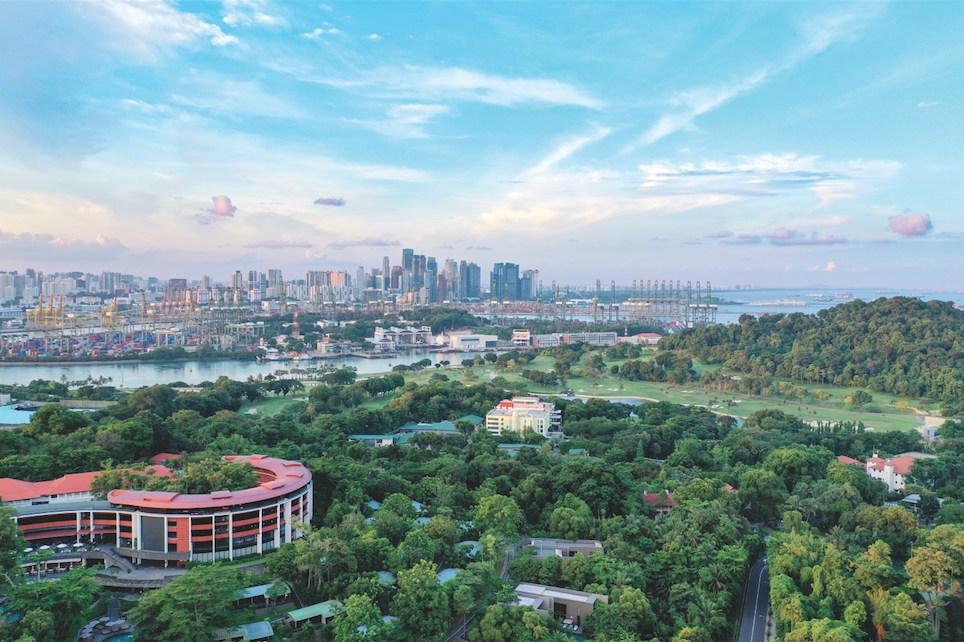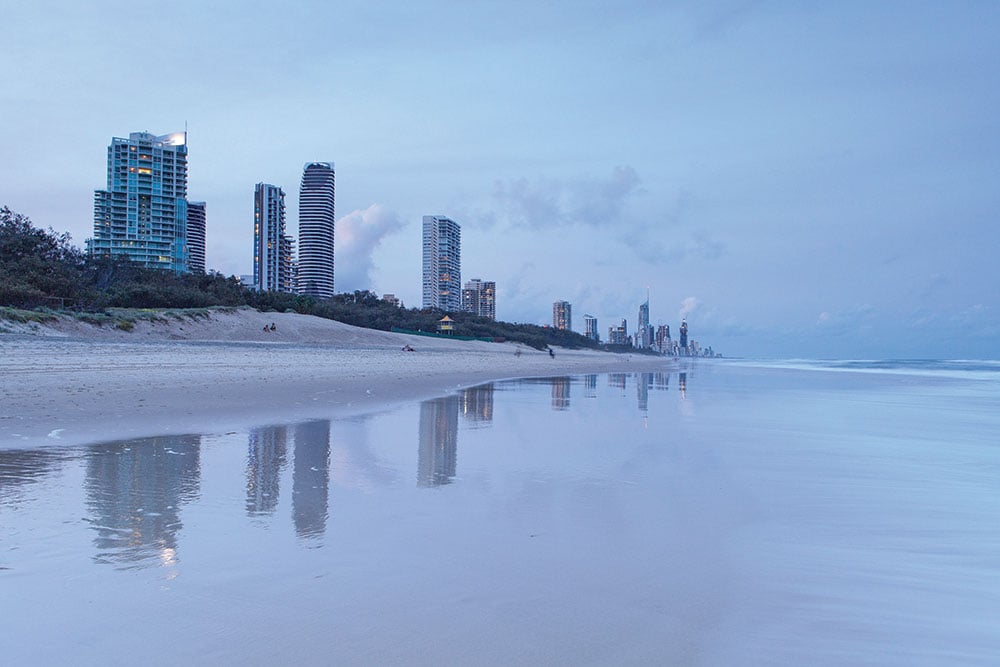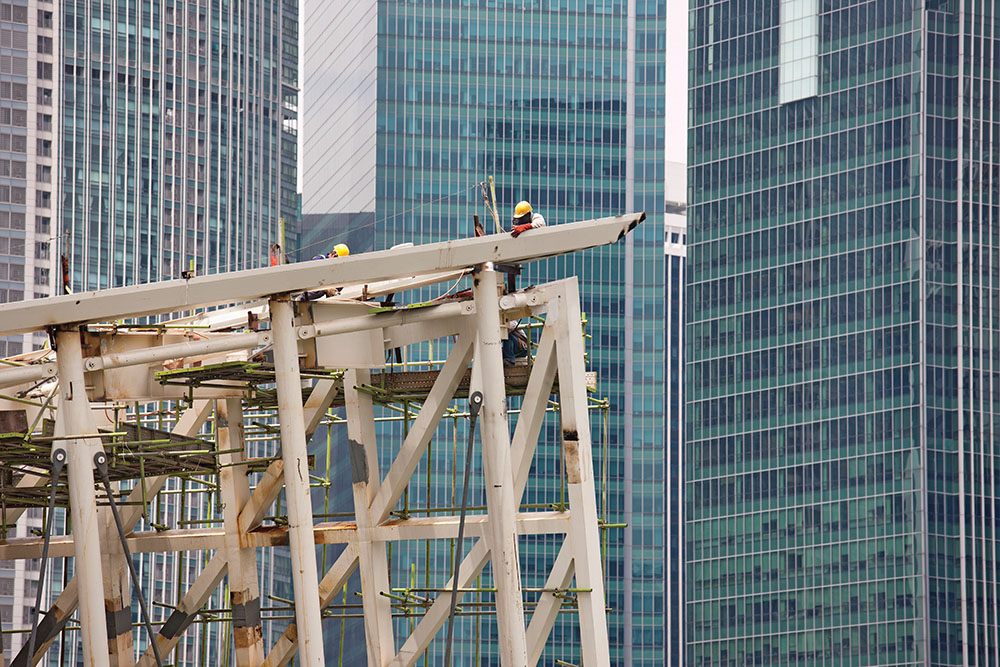Peter Wilding is more into action than talk. The Managing Director of the Royal Group of Companies likes to get the job done without too much “chitchat”, preferring to get on with business rather than waxing lyrical about it. He adopts the same approach when it comes to singing his company’s praises.

“I suppose we should be doing more promotion,” he admits. “But we’re a very private organisation and tend to just get on with business rather than celebrating our achievements.”
Modesty and discretion aside, those achievements are many and there is a lot to celebrate at Royal Group, particularly when reading through the company’s portfolio, which resembles a who’s who list of Asia–Pacific real estate.
Among the prestigious developments and proposals in Singapore are the Raffles Villa, Sofitel Singapore Sentosa Resort & Spa, the Orange Grove Serviced Apartments and the Lucky Plaza shopping centre, recognised as the group’s iconic anchor.
Headquartered at Raffles Place in Singapore’s CBD, the Royal Group has been laser focused on investing in real estate, developing and managing properties across the Asia–Pacific region for more than 70 years.
Its wide range of projects, including office towers, shopping malls and hotels, is scattered across Singapore, Malaysia, Indonesia and Australia, and attracts prominent tenants from a multitude of industries such as banks, law firms, business schools, executive business clubs, fast food chains, food courts, serviced offices, department and specialist stores, and fashion boutiques.
Peter joined the company in 2015, having worked predominantly for public companies in Australia and Asia. It was his strong relationship with Royal Group Founder and Chair Asok Kumar Hiranandani that encouraged him to join the family business founded as a textile company in 1947 by Asok’s father, Naraindas Hiranandani.
“We’re good friends,” he explains. “My relationship with him goes back more than 20 years. So it was a great opportunity for me to work in a family business, particularly one I’d known for more than two decades. It was an initial test to do something together, and it’s really worked because we’ve got such a strong friendship.”
Peter grew up in Australia, beginning his career in 1985 as a site engineer with construction company Civil & City, now the construction arm of the Lend Lease Corporation.
Over a decade and progressing to the role of Senior Project Manager, Peter was actively involved in some of Sydney’s most prestigious projects, including the city’s first major stadium, the Sydney Football Stadium, Parramatta Stadium, ANA Hotel (now Shangri-La) and the Presbyterian Ladies’ College in Croydon.
We’re a very private organisation and tend to just get on with business rather than celebrating our achievements.
In 1995, he was appointed Project Manager of Multiplex Construction, another Australian company that handled many of Royal Group’s projects. Just two years later, he was promoted to Regional Director Asia and Director NSW, setting up the framework for a sustainable multiplex business in Singapore.
“That’s when the relationship with the Hiranandani family started,” Peter reflects. “As I moved on through my career, I always remained very close to them.”
Other senior roles followed as Peter continued his career, including General Manager Australand Holdings, Deputy CEO at Capitala and Associate Director of Real Estate and Hospitalities at Mubadala Development Company, a wholly owned investment vehicle of the Abu Dhabi Government.
After 16 years accruing experience working in those senior roles at some of the world’s largest global contractors and developers, Peter went back to Singapore and Lend Lease as Managing Director of its Asian Project Management and Construction business unit, charged with growing the business through innovation and sustainability and establishing a strong safety culture.
However, just two years later, he was approached by Asok to join the Royal Group. “We basically just sat down one day and he said, ‘Why don’t you join? Why don’t we do this and this?’” he reflects.
“I said, ‘Yeah, sure. Let’s go.’” Peter says that while the Royal Group always has multiple developments underway, the family culture has been maintained with a leaner and more efficient, rather than a layered and complex, structure. He describes Royal Group as extremely capable in acquiring sites, taking on all their complexities and developing them before finally administering them through third-party operators.

“Even though we are now very much a development business, the organisation still doesn’t employ a lot of people,” he says. “Having said that, we certainly do a lot of work compared with our competitors, who are sometimes jealous of the fact that we can move faster. We just keep it very tight.
“I’ve worked with very large groups, I’ve worked with public companies, I’ve worked with sovereignfunded wealth and, while they have significantly bigger balance sheets than Royal Group, we are able to move faster. We’re not seen as an organisation that says one thing and does something else.”
Peter admits Royal Group’s latest project is particularly ambitious. It’s the Raffles Sentosa Resort & Spa, a tropical paradise built to perfectly complement the original and historic Raffles Hotel opened in 1887.
While Raffles was originally conceived as a beachfront property, and indeed, built from a beach house on Beach Road, the city of Singapore was built around it, which means it’s now nestled in the bustling centre of the Lion City.
In contrast, this second new Raffles, to be built in partnership with Accor on Sentosa Island, will feature 62 villas scattered over 100,000 square metres of sprawling tropical gardens boasting views over the South China Sea.
Ranging in size from 260-squaremetre one-bedroom retreats to four-bedroom family havens comprising 450 square metres, each villa will feature its own courtyard and private pool with a suspended day bed.

Along with signature luxuries, famous in its city counterpart, such as Raffles Butlers and the Raffles Spa, the resort will offer a bar, fitness centre, celebration room, two meeting rooms and restaurants. “It’s taken more than two years to get to where we are today with the concept and the idea,” Peter reflects.
“Obviously, our landlord, the Sentosa Development Corporation, has played a big role in the planning as it’s important they’re comfortable with what we’re doing. Yes, it has taken quite a long time but, in doing so, I think we’ve ended up with an amazing scheme. “It will be the first villa-only hotel in Singapore,” Peter explains.
“It’s the result of doing a lot of study into luxury resorts in Singapore and in Sentosa, where we found there is demand from tourists who want privacy and security. If we didn’t launch this new Raffles villa hotel, we would be losing those tourists to other parts of Asia.”
The resort, set to open in 2022, also triggers a memory for Peter, who read an article years ago about Raffles celebrating a major birthday. It made reference to one of the original guests agreeing to stay as long as they were given “a room with a view of the water”. “I realised then how much Singapore has evolved,” he says.
“Now we have the opportunity to re-create it all over again and put Raffles back on the water.” In Malaysia, the Royal Group refurbished and developed three Hilton hotels in Kuala Lumpur, eventually flipping the Hilton Garden Inn North and Hilton Garden Inn South, while retaining the DoubleTree by Hilton.
Last year, the company bought the Wisma KFC, a 22-storey building located in Kuala Lumpur’s prime commercial, shopping and entertainment hub, the Golden Triangle.
The building had been unoccupied for years after it was bought from KFC by The Employees Provident Fund in 2004, and Royal Group plans to redevelop the former Malaysian headquarters of the fast food giant into a 430-room luxury hotel.
Meanwhile in Australia, plans to expand, particularly in the hospitality sector, see the Royal Group building at least three hotels on Queensland’s Gold Coast. One proposal includes a US$35.4 million tower at Broadbeach that Peter describes as being “light and fresh” and aimed at millennials.
“While each market in each country is very different, there are similarities,” he says. “They’ve all got strong approval processes and we have to work with the authorities to decide what works for us and for them. That’s always the case wherever we are.
“However, there are certainly different delivery methods, banking procedures and ownership structures. Each country has a very different playbook, which we have to deal with. In Australia, there are even stark differences for dealing with governments from state to state.
“What excites me most in this business is how broad it is. We could be buying, we could be selling, we could be developing, all in the one day. We’re an opportunistic player, where we’re not bound by the party shareholders to make decisions or to pool profits for that annual return. We’ll take a very different view of a development, which means we can be faster and much more nimble. Actually, I think the real point of difference in working at Royal Group is probably our speed getting in and getting out.”
Leading an ever-evolving business capable of throwing a curve ball in a heartbeat, Peter says his job is never dull and concedes it comes with challenges, particularly when Royal Group’s strategy is often based on looking for something different.

The company often looks for properties that are not so straightforward, endeavouring to find the potential others may miss. “The challenges are in the markets we deal with,” he explains.
“These markets are all mature and we’re trying to carve out opportunities from them and, naturally, because we’re a family group, we look for higher levels of profitability compared with most others. That means we’ve got to work harder.
“The pricepoints for the properties we are trying to acquire tend to be quite high, so what we do is look for something that’s not so obvious and, therefore, perhaps see an angle that other groups may not. Of course, that’s always challenging because if all those players have worked on finding potential and they’re not seeing it but we are, are we really seeing it?”
Peter relies heavily on working extensively with solid, reliable and loyal partners, describing their relationships as “vital”. He explains that being a family company based in Singapore, working offshore can lead to things going “horribly wrong”.
It’s why he insists Royal Group seeks the ultimate in professionalism when it comes to selecting contractors, consultants and operators, along with mutual respect such as the company has enjoyed with long-term partner LK Ang Construction, which has carried out many developments for Royal Group.
“We’re a very consultative-based group and have been able to grow the business while growing relationships. That also helps us avoid legal disputes,” Peter laughs.
“We probably only have two or three contractors, five core consultants, four operators and about four banks. We’re tighter than other groups, but that works for us.
We don’t have to assemble a new team as the majority of our consultants have been working with me for more than 10 years in direct negotiations. It’s the same with our contractors and operators. So there’s no need for that courtship; we can start the marriage immediately.

“We are taking these partners into areas where they may not be used to working, so we only do this on the premise that we know they’ll work honourably, diligently and intelligently. That’s important to us. For example, we will sit with our operators to get an understanding of the brand they want to put out into a market. Then we’ll work with them to see whether we can identify a property that works well with their strategy. It’s probably another point of difference for us – the fact that we really do lean on our partners and they lean on us. The family extends when a partner is unable to enter into a new region and recommends someone else.”
Having previously worked with a large diversity of organisations, Peter describes his role with Royal Group as “refreshing”. He says his experience with larger organisations has made him appreciate the family company he now directs.
He particularly enjoys the collaboration the company insists upon, talking constantly to people about the market and the state of play, and where the opportunities lie. “We are a listening group,” Peter reflects.
“We listen to the market and to our partners, then we make a decision from there. We want to be honourable, not be seen as an organisation that says one thing and does something else.”
It’s not just the Royal Group’s relationships and credibility that makes the business a stand out for Peter. Once again, he refers to the company’s extraordinary speed to deliver projects as a popular selling point, comparing his own experiences working with larger organisations. It’s all part of Peter’s persona of believing actions speak louder than words.
“Throughout my career, I’ve always pushed to ensure that whatever is said is then done,” he says. “Too much chitchat, too much smoke and mirrors, it just takes up time. I think if you do what you say you’re going to do, then you become much more efficient. And, as I said, our strength is that we move fast. Our decision-making process is immediate, which nowadays is incredibly unusual for the size of our business. But our speed to act has been very important for us.”


